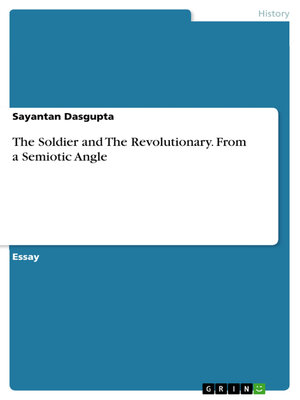
Sign up to save your library
With an OverDrive account, you can save your favorite libraries for at-a-glance information about availability. Find out more about OverDrive accounts.
Find this title in Libby, the library reading app by OverDrive.



Search for a digital library with this title
Title found at these libraries:
| Library Name | Distance |
|---|---|
| Loading... |
Essay from the year 2017 in the subject History - Miscellaneous, University of Calcutta (Indian Statistical Institute), course: Masters, language: English, abstract: This essay is about using a semiotic angle to evaluate the existence and activities of a soldier and a revolutionary in a stratified manner. The most common definitional difference between a soldier and a revolutionary is that a soldier is a person who serves in an army and obeys orders given to him by a government, and a revolutionary is someone who is involved in causing a complete or dramatic change in a society, country or in the international sphere. My concern, here, is the projection of a soldier who is a part of a national government and a revolutionary in both national and international sphere. The word 'soldier' is used, almost unanimously, in a positive sense. But the word 'revolutionary' is used in both positive and negative sense. The reason is, a soldier is always on the government's side, whereas a revolutionary stands against the government. I am not here taking into account the notion of 'government-in-exile' as I am, here, dealing with a country's electorally elected government, and a government-in-exile is also a revolutionary government or organization and it stands on the opposite side of an electorally elected government.







